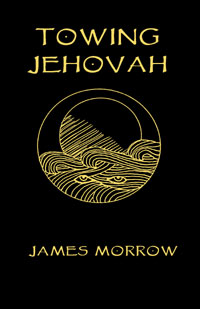If you intend to take my advice about what books to read only once, forget all the previous posts in this series and remember this one.
 The 2-mile long corpse of God is found floating dead in the ocean. The Kingdom of Heaven and the Vatican quickly move to give the body a proper burial and hide it from public view; the angel Raphael tasks Anthony Van Horne to captain the supertanker Carpco Valparaiso on a mission to tow the body to safety in the Arctic. Meanwhile, literally militant atheists (from a group suspiciously resembling CFI-NY) mobilize to bomb the corpus dei into oblivion using a private airforce composed of WWII vintage aircraft, and a series of natural disasters threaten to ruin everything for all concerned.
The 2-mile long corpse of God is found floating dead in the ocean. The Kingdom of Heaven and the Vatican quickly move to give the body a proper burial and hide it from public view; the angel Raphael tasks Anthony Van Horne to captain the supertanker Carpco Valparaiso on a mission to tow the body to safety in the Arctic. Meanwhile, literally militant atheists (from a group suspiciously resembling CFI-NY) mobilize to bomb the corpus dei into oblivion using a private airforce composed of WWII vintage aircraft, and a series of natural disasters threaten to ruin everything for all concerned.
An array of characters from all faiths and none each struggle to cope with the death of god in their own way. To quote the author:
Anthony Van Horne’s cargo becomes a kind of three-dimensional Rorschach test. For radical feminists, a male Corpus Dei implicitly ratifies the patriarchy and must be blown out of the water. For the Catholic Church, God’s body is both a sacred trust and a thoroughgoing embarrassment; the sooner it’s secluded in its tomb, the better. For atheists and humanists, the corpse is no less of a scandal; if God is dead, then He once existed, and the secular worldview is therefore invalidated.
In this sense, Towing Jehovah evokes “The Blind Men and the Elephant,” the Hindu folk tale in which each member of a troupe of blind men reaches a different conclusion about the same pachyderm depending upon which part he encounters: trunk, tusk, tail, ear, leg, or side.
If you’ve ever wondered whether an omnipotent being has the power to permanently off himself, and how humanity would learn to live with that loss, then probably you should read this book.
Edit (15-Aug) – If you’d like to hear more from James Morrow, I have an old interview of him up here and here.
